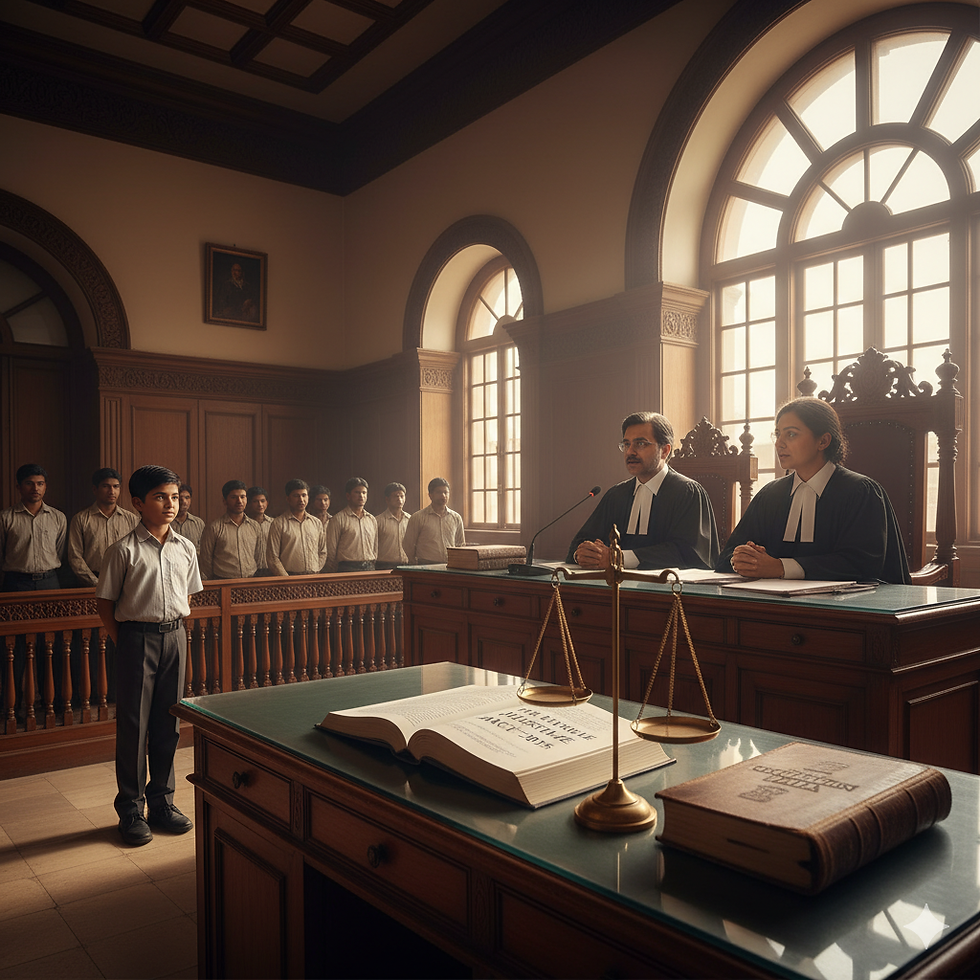Allahabad HC: Juvenile Justice Act Overrides All Other Laws for Child Accused
- Lawttorney.ai

- Nov 10, 2025
- 3 min read
Case title: Pawan Kumar (Corpus) and Another v. State of Uttar Pradesh and 4 Others.
Introduction
The High Court of Allahabad has strongly affirmed that the Juvenile Justice (Care and Protection of Children) Act, 2015 (JJ Act) takes precedence over all other legislation in matters concerning a child in conflict with the law in Pawan Kumar (Corpus) and Another v. State of Uttar Pradesh and Others (2025).
The Division Bench, consisting of Justice Salil Kumar Rai and Justice Sandeep Jain, stated that the supremacy of the Juvenile Justice Act applies at all stages, including apprehension, detention, prosecution and imprisonment, to guarantee that no minor is classified as an adult offender under the standard criminal law.

The Case at a Glance
The claimed incident in 2017 was held in Naini Central Jail with adult defendants; the petitioner was 14 years, 3 months, and 19 days old. The JJ Board accepted his minority status; he stayed in touch. The High Court considered a writ of habeas corpus, questioning the lawfulness of his ongoing detention.
There were multiple important conclusions that the court reached who supported the integrity of the procedural and substantive protections outlined in the Juvenile Justice Act.
Overriding Effect of the Juvenile Justice Act
The Court determined that the provisions of the Act take precedence over any contradictory laws, such as the Indian Penal Code (IPC) and the Code of Criminal Procedure (CrPC), referencing Section 1(4) of the JJ Act, which starts with a non-obstante clause. This guarantees that minors facing legal issues are regulated exclusively by a system intended for their safety, rehabilitation, and welfare.
The Court’s interpretation emphasizes that juvenile justice is not merely part of criminal law but a rehabilitative system, separate and focused on reintegration instead of punishment.
Detention of Juveniles: A Strict Prohibition
The Bench emphasized that according to Section 10 of the JJ Act, a child claimed to conflict with the law must not be confined in a police lockup or prison under any situation. Even while the age determination investigation is ongoing, Section 9(4) requires placement in a “place of safety”, rather than a prison. The authorities' inability to adhere to these regulations made the petitioner’s detention unlawful, leading the Court to mandate his prompt release and instruct the trial court to submit the case to the Juvenile Justice Board for suitable measures.
Habeas Corpus as a Safeguard of Liberty
In a notable reaffirmation of constitutional tenets, the Court ruled that a writ of habeas corpus may be issued even against a judicial detention order if that detention is deemed unlawful. Citing the Supreme Court cases of Manubhai Ratilal Patel v. State of Gujarat and Kanu Sanyal v. District Magistrate, Darjeeling, the Bench emphasized that courts have the authority to assess current detentions that contravene the protections outlined in the JJ Act.
Procedural Safeguards: Mandatory, Not Discretionary
The ruling explained that the processes under the Juvenile Justice Act are not just formalities, but they are essential rights. Any divergence undermines a child's constitutional and statutory rights, and adherence to these protections is imperative.
The Court further specified that bail for minors must be requested solely under Section 12 of the JJ Act at the Juvenile Justice Board. Filing under general criminal provisions, as seen in this situation, was procedurally improper and against the law.
No Waiver of Rights
A major observation by the Bench was its claim that the rights of a child as outlined in the JJ Act cannot be waived. Taking into account their age and vulnerability, children should not be expected to assert or relinquish rights as adults do. As a result, it is the duty of the justice system, including the police and the courts, to proactively ensure these protections are upheld.
Way forward:
The JJ Act is mandatory, prevailing, and absolute, as clarified by the Allahabad High Court’s ruling in Pawan Kumar v. State of Uttar Pradesh. It emphasizes that every child, regardless of their circumstances, has the right to protection within a system focused on rehabilitation instead of punishment.
By adhering to these principles and leveraging innovative platforms like Lawttorney, the legal community can uphold its dedication to a justice system that is caring, considerate, and centred on children, exactly as specified in the Juvenile Justice Act.
Empower Your Legal Practice with AI – Join Our Free Webinar!
Are you a legal professional looking to boost your efficiency and stay ahead in a competitive field? Discover the power of Lawttorney.AI – the cutting-edge tool designed to streamline legal research, automate tasks, and enhance productivity.
👉 Don't miss out! Reserve your spot in our FREE webinar and experience the future of legal practice today. Register Now




Comments